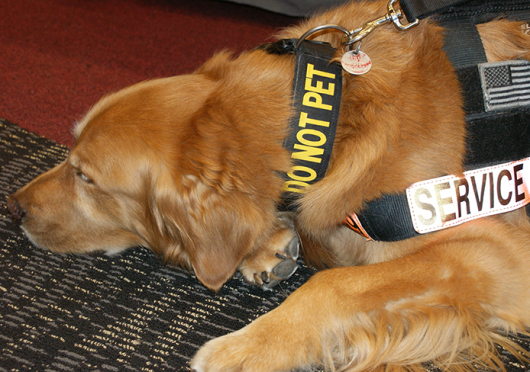
Many of the nation’s service animals are utilized for assistance by military veterans suffering from difficulties after returning home from combat zones. Credit: Isabelle Beecy / Lantern reporter
Most people don’t often think about how a service dog could save someone’s life.
But Luis Carlos Montalván, a former U.S. Army captain who suffers from post-traumatic stress disorder, mild traumatic brain injury and spinal damage, relies on his service dog, Tuesday, to help him to be independent and live on his own.
“He enables me to sleep so that I can function during the day. He reminds me to take medicine,” Montalván said. “If I’m feeling stress (or) anxiety related to war or not, he knows it. Not 80 percent knows it, not maybe knows it, not almost knows it. He knows it.”
During his visit to the Ohio State College of Veterinary Medicine on Tuesday evening, Montalván talked about how Tuesday helps him on a daily basis. He also touched on bigger themes of how animals, especially dogs, can assist humans in recovery from and dealing with disabilities of all kinds, especially those suffered by veterans returning home from combat zones.
Montalván is the author of “Until Tuesday: A Wounded Warrior and the Golden Retriever Who Saved Him,” a New York Times best seller about Montalván’s bond with Tuesday.
There are approximately 100,000 to 200,000 service animals in the U.S., according to Service Dog Central, an online community forum for service dog partners and trainers. Susan Schubert, the director of the Columbus chapter of Pets for Vets, said talking to a psychologist at the VA is one of multiple ways for veterans to be able to receive a service dog.
Montalván said service dogs can be the lift some need in order to successfully complete a challenging task. Some of the things dogs help with include learning to read, aiding children and teens as they testify in court, or assisting those who might otherwise be stuck making trips in and out of the hospital successfully live on their own.
Montalván said Tuesday’s aunt Rosie was one of the first courthouse therapy dogs in the state of New York. Like other courthouse therapy dogs, it’s Rosie’s job to accompany minors to trial and help calm them while they give testimony.
Sarah Fries, a second-year graduate student in social work, said as an intern at a hospice, she sees the impact therapy animals have on older patients.
“It just shows me that animals work with anybody with any problem,” she said. “And it’s nice to see that it’s not only being used in my area of the field, but it’s being used in various areas of the field.”


